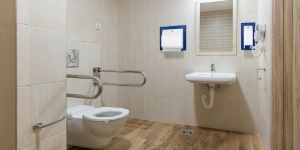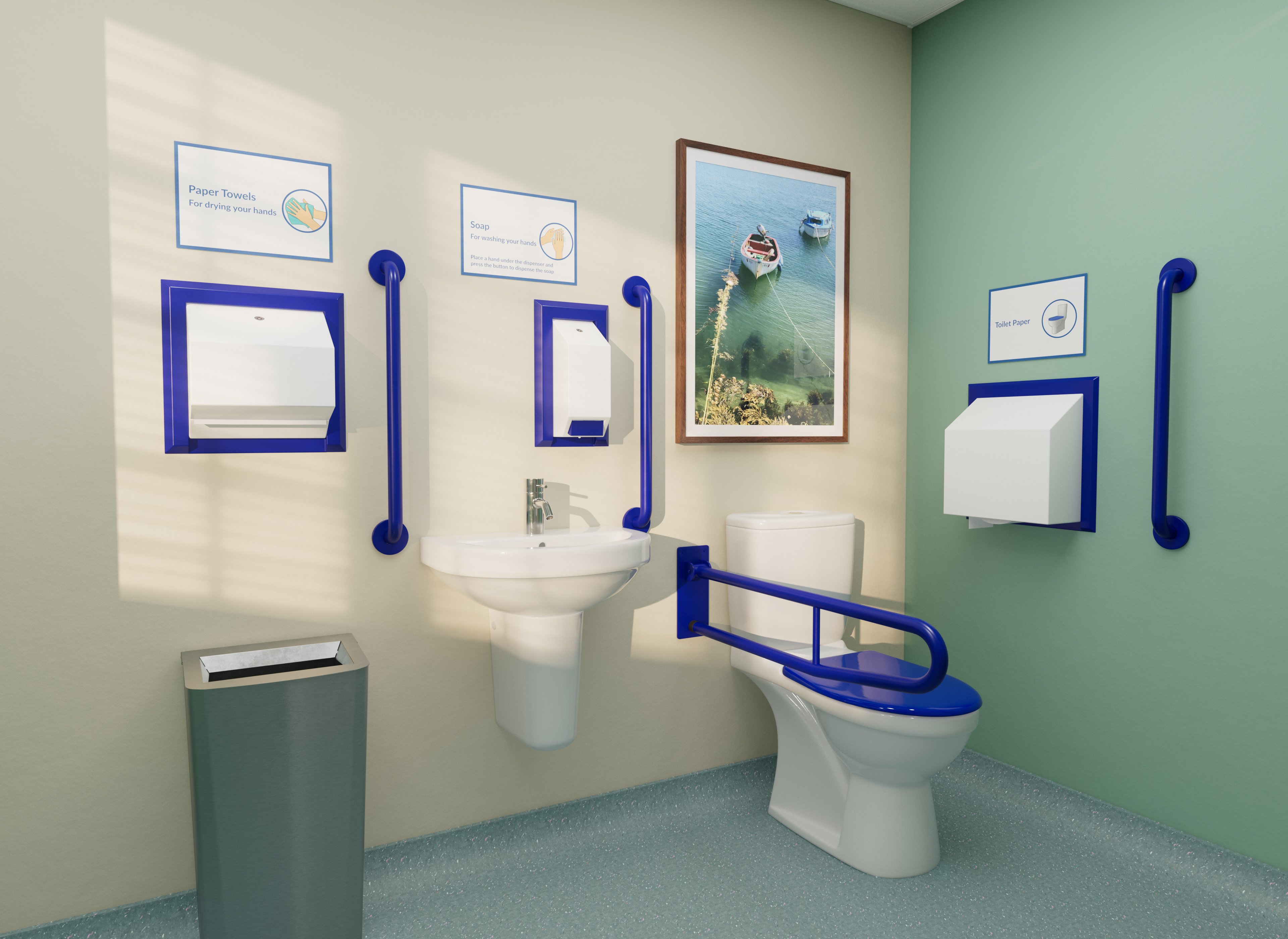How to Provide a Dementia Friendly Commercial Washroom

August 2, 2022
Dementia is perhaps not a subject you would expect us to talk about as a hygiene dispenser manufacturer. However, there are currently 900,000 people living with Dementia in the UK and this is projected to rise to 1.6 million by 2040. This presents important challenges to our society as a whole and things that we take for granted in a washroom setting can become confusing and imposing to those with Dementia.
Supporting someone living with Dementia with day-to-day activities helps maintain their independence and dignity. Small adaptations in a washroom can make a significant difference, ensuring the washroom is dementia friendly for all settings, whether that be within a care home or another commercial space. In this blog we take a look at the most common bathroom issues associated with people living with dementia, and outline steps your establishment can take to create an accessible washroom experience for all.
Common Bathroom Issues for People Living with Dementia
Dementia brings many complex symptoms, one of which can be the difficulty in performing familiar tasks such as handwashing or going to the toilet. This can become confusing and overwhelming for someone living with dementia and can lead to a highly distressing experience and challenges in the future. Common issues that those with dementia experience when using a bathroom include:
- Not being able to find or recognise the toilet.
- Not understanding the signals of needing to use the toilet.
- Not being able to communicate that they need to use the toilet.
- Forgetting important steps when using the toilet, such as undoing clothing, where to find the toilet paper, washing their hands or drying them.
- Safety concerns such as water on the floor or shower, leading to falls.
- They may be incontinent as a direct symptom of dementia.
- They may then become embarrassed after an accident and try to handle it themselves.
- Reduced ability to detect contrasts between colours and be unable to identify what is in the washroom.
So, what can we do to make using a commercial washroom a more positive and inclusive experience?
Dementia Care and Washroom Design
The various steps of the bathroom journey, such as wetting hands, applying soap and drying hands, all require the ability to recall the order in which these tasks should be performed. For people with dementia, this can be particularly challenging. To help aid the washroom journey for users with dementia, there are various design considerations.
Use Natural Lighting
It is recommended that natural lighting should be used as much as possible as this primarily helps to distinguish between night and day, but clever lighting can also be used to avoid casting shadows and lighten dark areas which can cause confusion. It is important to ensure that washrooms have adequate lighting, particularly when using the colour coding feature which we will move onto next.
Colour Coding
When designing a bathroom, the use of contrasting colours should be considered as this can be particularly helpful for those with dementia. Using colour can help remove much of the visual noise that the user may find disorientating and will help aid recognition of particular items.
The pacifying effects of certain colours should be taken into consideration as this can help to reduce the risk of distress. Blue is often seen as a calming colour, so adding white dispensers set on blue wall plates offers a high contrast whilst also helping to soothe the washroom user. The same colour can be used across all washroom items. This is where our washroom dispenser range designed specifically for creating dementia-friendly bathrooms can help. The range includes soap dispensers, toilet roll dispensers and paper towel dispensers with contrasting colours to make them easily noticeable and stand out from décor. These dispensers can also provide ‘guidance through colour coding’ and leads users on a simple journey through the washroom facilities.
The journey can also be supported by adding colour coded dementia washroom signs that visually explain how to use the washroom facilities to avoid confusion, encourage independent living and aid recognition for routine. Another idea can be to add colour coded tiles, strips, or arrows to help the user navigate through the washroom in a logical order.
Avoid Unnecessary Noise
Often, people living with dementia can be easily distracted by sudden or unnecessary sounds. When designing your washroom, you should consider using paper towel dispensers as opposed to hand dryers to avoid unnecessary noise. This will also be better suited to residential properties where it is important to reduce disturbance during the night.
Explore Dudley Industries Dementia Washroom Range
Dudley Industries’ dementia-friendly washroom range is specifically designed to help make the washroom a less confusing place for people living with dementia. The range is designed with white dispensers on a contrasting blue plate to reduce distress and to help distinguish them against the surroundings.
The range is manufactured using quality stainless steel and is powder coated to achieve the coloured finished. Made to the highest quality, as expected of a Dudley Industries product, the range was designed with a leading industry expert and therefore suitable for use in challenging environments whilst promoting a dementia friendly bathroom.
Contact Dudley Industries
Speak to a team member today to discuss installing Dudley Industries’ dementia range in your washrooms.
+44 (0) 1253 738311 or email sales@dudleyindustries.com
The guidance in this blog has been collated from:
https://www.alzheimers.org.uk/
The Alzheimer’s Society ‘Dementia Friends’ programme aims to change the understanding, perception, and awareness of dementia through awareness. To learn more about the initiative please visit: https://www.dementiafriends.org.uk/
